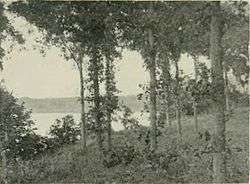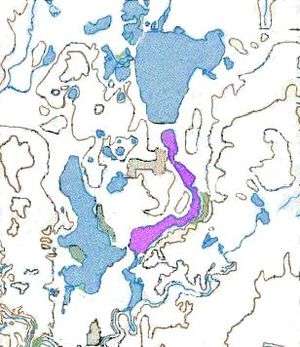East Okoboji Lake
East Okoboji Lake is a natural body of water, approximately 1,835 acres (7.43 km²) in area, in Dickinson County in northwest Iowa in the United States. It is part of the chain of lakes known as the Iowa Great Lakes. The area was long inhabited by the Santee or Eastern Dakota Sioux. The lake was known after its Dakota-language name, Okoboozhy, meaning reeds and rushes.
| East Okoboji Lake | |
|---|---|
 (1903) | |
| Location | Dickinson County, Iowa |
| Coordinates | 43°24′17″N 095°04′31″W |
| Basin countries | United States |
| Surface area | 1,835 acres (743 ha) |
| Average depth | 10 ft (3.0 m) |
| Max. depth | 22 ft (6.7 m) |
| Settlements | Spirit Lake, Okoboji |

History
The towns of Spirit Lake and Okoboji, founded as European-American settlements in the nineteenth century, sit along its western shore. They became notable after the Spirit Lake Massacre of 1857, when a renegade band of Sioux attacked the frontier settlements, in part for food, because they were suffering starvation during a severe winter with heavy snows. It was the last Native American attack in Iowa against settlers.
Geology
Geologically, the lake, like its neighbors, is a glacial pothole, a remnant of the most recent ice age approximately 13,000 years ago.
The lake is shallow, with an average depth of 10 ft (3 m) and a maximum depth of 22 ft (7 m). During the summer months, it is prone to stratification and to overgrowth with algae.
Fishing
The lake is a popular fishing destination in the region, especially for bullheads.
Media
The lake was the main setting of the fourth X-Files episode, The Conduit. However, the episode was filmed in British Columbia, with Buntzen Lake being used as Lake Okobogee.
External links
- Iowa Great Lakes Region
- Iowa Department of Natural Resources site on East Okoboji Lake
- University of Iowa site on East Okoboji Lake chemistry
- U.S. Geological Survey Geographic Names Information System: East Okoboji Lake